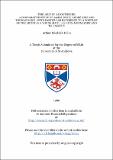The artist as outsider : a comparative study of James Joyce, André Gide and Thomas Mann : with particular reference to 'A portrait of the artist as a young man', 'Les Faux-monnayers' and 'Dr Faustus'
Abstract
""The Artist as Outsider" certainly is a very popular subject for
literary criticism. Nevertheless, I have chosen it believing strongly that
there are two points which I can make and which have not been made before:
The first point consists in showing how strong the intermediary position of
Joyce, Gide and Mann, through their treatment of the outsider theme,
between the nineteenth-century literary tradition and a completely new era
were. The second point consists in showing how the three authors'
experimentation with form is intrinsically linked with the actual subject
of the novels-the outsider position of the hero.
Let us first consider this "intermediary position": In the Romantic
and Symbolist tradition it is indeed very common to find the author
mirrored in his work of art, mirrored a bit self-complacently as somebody
who is not understood and who, because of his unfavourable environment,
either fails to fulfil his vocation or becomes more and more estranged
from the society he lives in. As in Wilde's The Picture of Dorian Gray,
the artist is not only seen as a decadent deviant figure, but also as a
doomed and tragic character. Lombroso and many others had developed
theories according to which the creative artist was "bound" to be afflicted
by some deviation, be it disease, crime, or anything else which is
suspicious to the average bourgeois. Baudelaire and Poe were known to have
taken drugs in order to depart from this world and have experience beyond,
in a fantastic, imaginative realm. As I try to show, most of these clichéd
themes were taken up in the three novels of my choice. But at the same
time - and this is less obvious - a new view of the artistic creativity and
the outsider phenomenon was interwoven: according to the traditional
view, the artist becomes an outsider because of his eccentric qualities;
according to this new view, however, the outsider position comes first.
The individual is no longer born with his artistic vocation and becomes
eventually estranged from his fellow men, because of these
"artist-qualities", but his estrangement is innate-and therefore only he
is destined to be artistically creative. Cause and effect are, in this new
argument, interchanged. The view of the outsider character as an intrinsic
part of some rare human beings' existence announces heroes like Meursault
and Roquentin who are outsiders par excellence and whose tragic ends are
only explicable by the fact that they refuse to fulfil their destiny which
is to be artistically creative. I therefore take Meursault and Roquentin,
together with some other Existentialist heroes, as failed artists who, in
the way I have described, can be taken for sons of the three heroes
Stephen, Adrian and Edouard." -- From the Introduction
Type
Thesis, MLitt Master of Letters
Collections
Items in the St Andrews Research Repository are protected by copyright, with all rights reserved, unless otherwise indicated.

